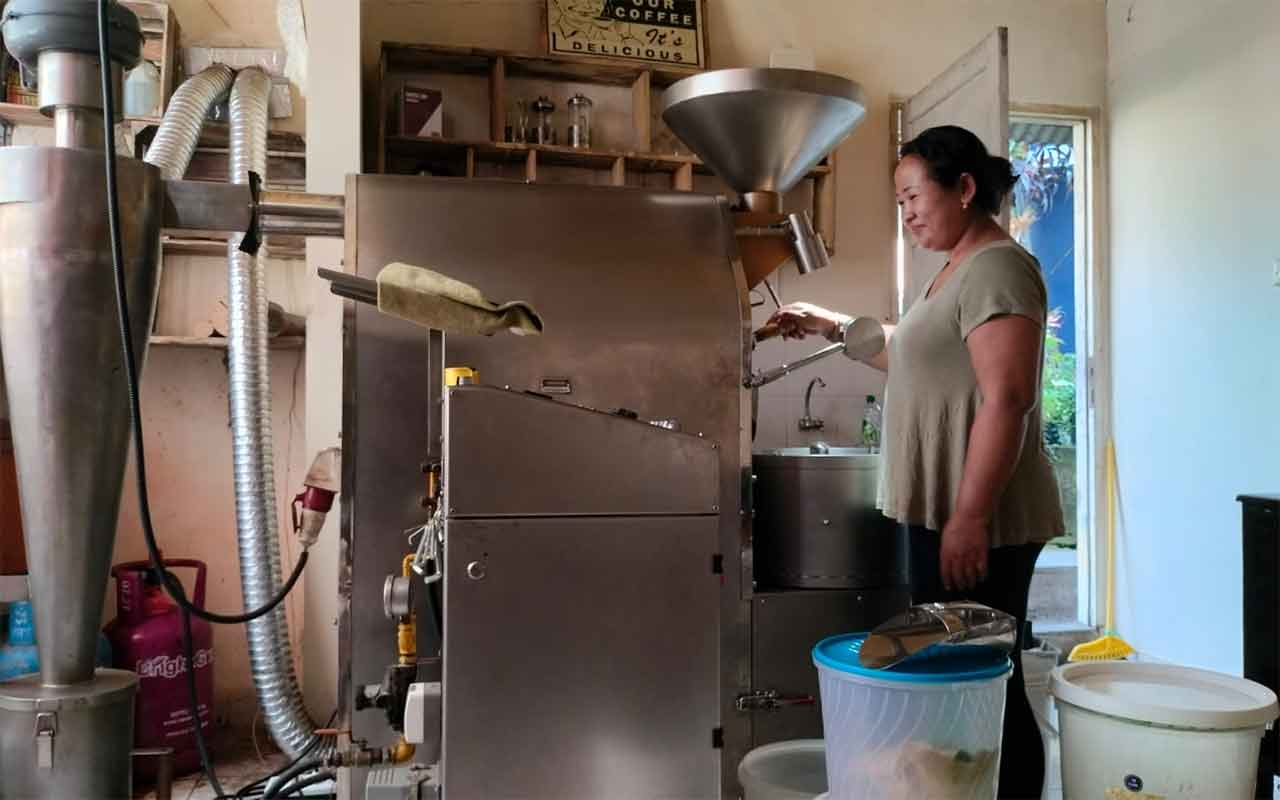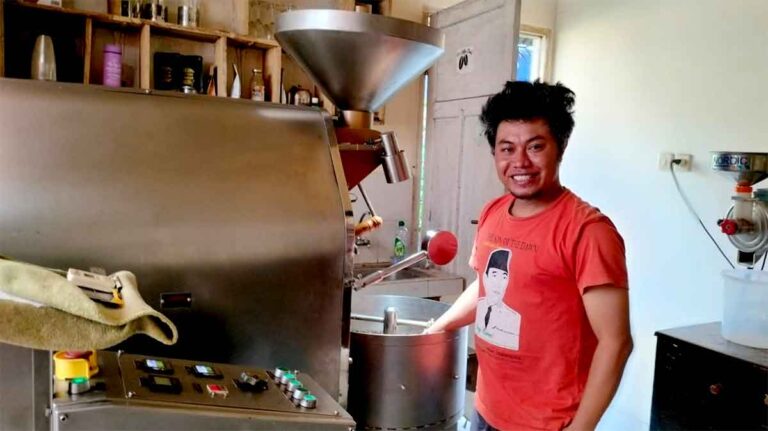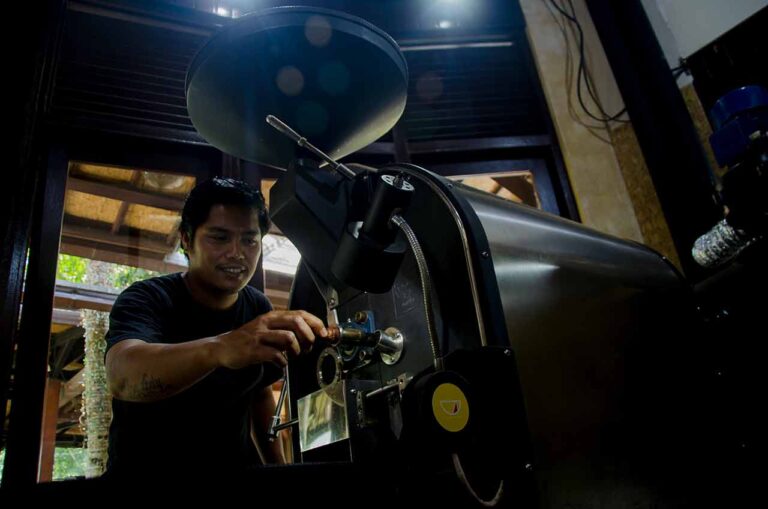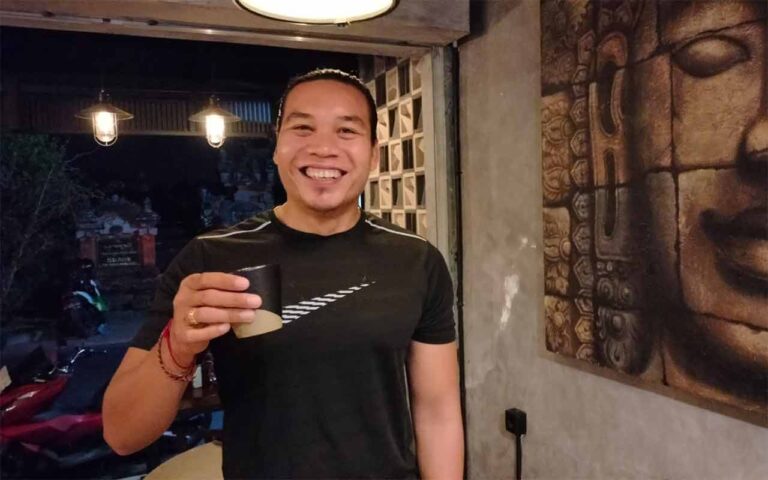The fragrance of coffee wafts through a small street in Tebesaya, Ubud. A female coffee roaster has just opened the discard port. The roasted coffee beans immediately flow, accompanied by a thin layer of smoke, towards the cooling bin of her roasting machine. A spinning of the mixing shovel is catching the beans and evening out the cooling process of the coffee beans, which are already dark in color.
The rotation of the fan at the bottom of the cooling bin sucks in hot air and shoots it through the exhaust channel. Bringing with it the fragrance of coffee from the “Bali Arabica” coffee roastery, it goes in all directions wherever it goes.
Made Srianing, a female coffee roaster in Ubud, is in action. This lady coffee roaster looks like she is having fun asking her roasting machine to dance.
Indeed, only she really knows the character of this 300-kg roasting machine. In fact, her husband, who first taught her how to roast coffee beans, now more often asks how to control the metallic machine.

Initially, this Bachelor of Arts graduate majoring in Japanese literature only helped with the bookkeeping of her husband’s coffee business. She never thought about getting directly involved in working with green beans and roasting machines.
One time, after returning from an out-of-town business trip, the husband admitted that he had met someone who had paranormal abilities there. When reading the luck line, the psychic said that his coffee business would run more smoothly if he involved his wife.
“From now on, learn coffee,” persuaded her husband, I Komang Sukarsana.
This family is still strong in maintaining Balinese culture, including listening to advice from spiritual leaders. Made Srianing immediately agree, even though she didn’t have the habit of drinking coffee.
“At first, I saw that all the coffee beans looked the same. “Even though my husband has shown me the difference between Arabica coffee and Robusta coffee,” she said with a chuckle, remembering when she was still very unfamiliar with coffee.
However, slowly, she was able to differentiate between types of coffee. Made Srianing can even very skillfully differentiate coffee beans from their type and post-harvest process.
“Now, just from the smell of the green beans, I can tell which green beans are natural, washed, or honey processed,” she said.
She also learned to roast coffee by accompanying her husband a lot when roasting orders from many coffee shops in Ubud. Her husband showed her the functions of the control panel on the roasting machine.
The first experience of the practice of roasting coffee beans was forced by circumstances. She had to do it herself without being accompanied by a more expert husband.
“The first time I roasted was luwak green coffee beans,” she said.
Obviously, it was the most thrilling experience for her. She was forced to roast the expensive coffee beans because there was an urgent order from one of her customers. Meanwhile, her husband was out of town.
“If you roast it wrong, you could lose a lot,” she said with a chuckle, remembering that she was forced to replace her husband’s role in roasting Luwak coffee.
Fortunately, the coffee she roasted did not receive any complaints from customers. Since then, Made Srianing has had the confidence to help her husband roast coffee orders for their customers.
Now Made Srianing’s roasted coffee is very well known to its customers. Once upon a time, the task of roasting coffee was temporarily transferred to one of the staff. As soon as the customers received the coffee, they immediately protested because the roasting results were different.
“They immediately knew whether it was my roasted coffee or not,” said Made Srianing.
Roasting coffee is not just about understanding the theory and operation of the various panels in the roasting machine. However, it requires the ability to recognize the character of green beans, machine behavior, and how to make adjustments following the roasting process.
“Previously, technicians from the factory that makes the roasting machines that we use came to give us guidance so that we could get optimal roasting results. “But it turns out the results weren’t good,” said Made Srianing.
Many roasting customers complained. Made Srianing had to return to the roasting method, following her own style, which is more driven by intuition.
This female coffee roaster in Ubud actually doesn’t come from a coffee-producing area. She was born in an area near the Buleleng Beach area 38 years ago. But now she really knows coffee. She already knew the character of green beans from each coffee-producing region in Bali. Up to how to maximize the taste of the coffee with the roasting machine.
Now, apart from orders for online sales, Made Srianing regularly supplies 10 coffee shops in Ubud. On average, she has to roast 80 kg of green beans a day.
“Luckily, we now use big machines. “If you use a small machine like the previous one, I can only get a maximum of 30 kg a day,” she said.
The discard port closing handle has been lowered, meaning the roasting drum is ready to receive the next splash of green beans. The next batch of roasting has already started.
Made Srianing returned to dancing with the big machine she was so familiar with. The two of them seemed to understand each other, how to turn, when to slow down, and when to blow hot air out of the roasting drum.
As soon as she heard the first crack sound from the roasting drum, Made Srianing immediately understood what had to be done with the machine. Both communications are in the same language. The results of the roasting collaboration between Made Srianing and her machine are already widely liked, especially by customers of many coffee shops in Ubud.
From that small street, the fragrance of coffee continues its journey to all corners of Ubud.
Follow Made Srianing Instagram @nima_de_sri




